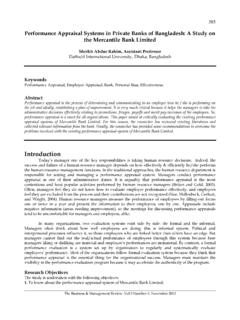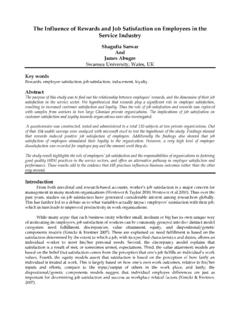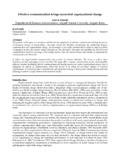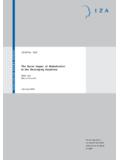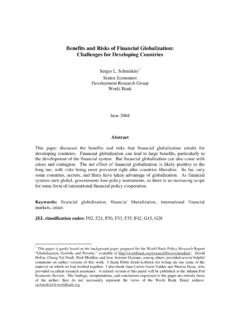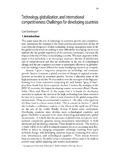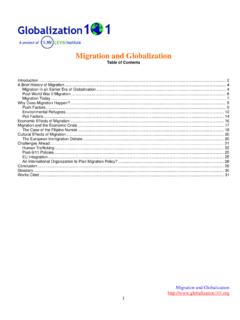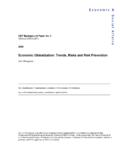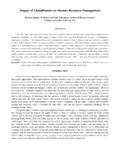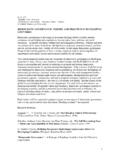Transcription of Globalization and its impact on Ethiopia - abrmr.com
1 The Business & Management Review, Volume 3 Number 4 June 2013 The International Conference on the Restructuring of the Global Economy (ROGE), London-UK 213 Globalization and its impact on Ethiopia Rao Wollega University, Ethiopia . Key words Globalization , Ethiopia . Abstract Since two decades of Globalization , it is a successful phenomenon in the world. Globalization helped the developed as well as developing nations with free flow of capital, goods and services made all the countries beneficial in the aspects of production and marketing facilities, generation of employment, reduction in poverty, infrastructural development etc. across the nations. This paper is based on general observations from Ethiopia and secondary data is obtained from the internet. Present paper discusses the Globalization and its impact on Ethiopia in three aspects political, social and economical. In the Political Globalization aspect Ethiopia has to reduce its bureaucracy and corruption, in social Globalization aspect Ethiopia has to keep up its culture because of its richness since ancient times, in economic Globalization Ethiopia has to achieve self sustainability, improve its infrastructure, regulate the prices, reduce VAT, revise the taxation structure in the country to enjoy the benefits of Globalization .
2 Introduction: According to International Monetary Fund, Globalization is growing economic interdependence of countries worldwide through increasing volume and variety of cross-border transactions in goods and services, free international capital flows, and more rapid and widespread diffusion of technology. Globalization may benefits the countries with increased productivity, availability of goods for cheaper prices, employment creation due to new start-ups from the foreign capital and innovative ideas due to free flow of information. At same time it will give some negative affects to the countries, by affecting domestic industry, widening the gap between rich and poor, monopoly of foreign companies, environmental degradation and cultural transition etc. Ethiopia is also waved with Globalization since its modern inception during 90s. Ethiopia is second most populous nation in Africa, with 83 million people with 70 ethnic groups who speak more than 80 languages.
3 Ethiopia 's economy is based on agriculture, which accounts for 46% of GDP and 85% of total employment. The per capita income is lowest in the world. Coffee has been a major export crop. The banking, insurance, and micro-credit industries are restricted to domestic investors, but Ethiopia has attracted significant foreign investment in textiles, leather, commercial agriculture and manufacturing. Ethiopia 's economy continues on its state-led Growth and Transformation Plan under its new leadership after Prime Minister Meles's death. In order to understand the impact of Globalization on Ethiopia , it is necessary to look at three different areas of Ethiopian society: its political history, the diversity of its social groups, and its economy. The Business & Management Review, Volume 3 Number 4 June 2013 The International Conference on the Restructuring of the Global Economy (ROGE), London-UK 214 1. Globalization and Ethiopian Political issues: The ancient Ethiopian monarchy maintained its freedom from colonial rule with the exception of a short-lived Italian occupation from 1936-41.
4 In 1974, a military junta, the Derg, deposed Emperor Haile SELASSIE (who had ruled since 1930) and established a socialist state. Torn by bloody coups, uprisings, wide-scale drought, and massive refugee problems, the regime was finally toppled in 1991 by a coalition of rebel forces, the Ethiopian People's Revolutionary Democratic Front (EPRDF). A constitution was adopted in 1994, and Ethiopia 's first multiparty elections were held in 1995. Since new democratic era of the country, Ethiopia adopted Globalization for its foster growth and development. In the era of Globalization the political situation in Ethiopia is far better than its past; it was full of suppressions of the opposition. Now people are enjoying real democracy in the country. Globalization resulted Ethiopia with effective and efficient foreign policy and various developmental plans. Successful Ethiopian foreign policy resulted great cooperation with both east and west resulted huge foreign donations as well as trade.
5 At the same time Ethiopian democracy suffers from excessive Bureaucracy especially Nepotism. Inequality and regional imbalances are the results of Excessive bureaucracy and Nepotism in the country. As per Corruption Perception Index 2012, Ethiopia placed at 113 is unwelcome situation to the country. Bureaucrats are the real players in the government and enjoying aristocratic life with huge personal wealth from massive foreign aid donations. 2. Globalization and Ethiopian Social issues: Since ancient times Ethiopia was an agrarian country but Globalization made an upswing in Ethiopian society with white collared jobs in NGOs and Banking Sector. Ethiopia s HDI value for 2012 is in the low human development category positioning the country at 173 out of 187 countries and territories, 1 rank improvement than previous year (174). Ethiopian government is committed to continuous development in the country with many developmental programmes with foreign countries collaboration.
6 Table 1 presents the human development indicators trends in the Ethiopia as progressive in almost all aspects. impact of Globalization on Human development in Ethiopia was really progressive. The progress in Human development index is the credit of Ethiopian development policies and The Business & Management Review, Volume 3 Number 4 June 2013 The International Conference on the Restructuring of the Global Economy (ROGE), London-UK 215 support of NGO s from various countries. The various UNDP Programmes, European Union countries programmes are really helps the country to improve its human development standards. Cultural transition is common effect of Globalization , Ethiopia is not an exception. Most of the Ethiopian people are speaking good English. The major Christian sects Orthodox and Protestants prohibits consuming alcohol, smoking and free sex in Ethiopia . But due to Globalization people perceive them as fashion and following all those ills.
7 Dress code of Ethiopia is transformed to western, the traditional way of dressing you can see only on festivals, especially urban locations of the country completely waved with western way of dressing. Ethiopia is waved with fast foods, pizzas and burgers; even in some rural areas you can find pizza shops. Coca-Cola is the market leader in soft drinks segment, now a day s Ethiopian people prefer to eat Pizza than Injira and drink Coca than Coffee. Language, music, food habits, religious beliefs, way dressing everything in the society is changed due to Globalization affect. 3. Globalization and Economic issues: Globalization affects developing nations through change in major market conditions. Globalization has to help the economies by increasing economic activity in the country with progressive GDP. Table 2 presents the GDP growth rate in Ethiopia since 2001. In 2005 Ethiopia achieved GDP growth rate but gradually the GDP of the country is declining and stood at 7 percent, indicates Globalization is not that much progressive due to closed economic policy of the country.
8 Still Ethiopia not opened up for some sectors to attract foreign capital. The economic freedom in the country is still regressive. In the Economic Freedom Report 2013, Ethiopia was 146th freest economy in the world and its overall score is declining. Table 3 presents inflation in the Ethiopia since 2009. In 2010 the inflation in the Ethiopia is single digit percent but in next year s it was increased to percent and percent respectively. The prices of goods in Ethiopia vary from shop to shop and region to region. Concentration of ownership in few hands leads to monopoly prices in the country, and there is no control mechanism for it. Due to this pricing the common man life is very hard to lead. Globalization has to benefit the country with reduction in goods price and down trended inflation but in Ethiopian case it was completely opposite means Globalization is not that much progressive in the country.
9 The Business & Management Review, Volume 3 Number 4 June 2013 The International Conference on the Restructuring of the Global Economy (ROGE), London-UK 216 Table 4 presents the external trade of Ethiopia with rest of the world since 2010. Ethiopia exports are increasing; the major exports are coffee, qat, gold, leather products, live animals, oilseeds. Ethiopian export trade is vulnerable due to the export prices are more volatile and decided by market forces in the international market. Further table 4 presents Ethiopian imports are also increasing. The major imports are food and live animals, petroleum and petroleum products, chemicals, machinery, motor vehicles, cereals, textiles. The major imports are food and clothes, they are basic needs for a human being and Ethiopia is dependent on other countries for its basic needs and it was pitiable situation. In international trade countries get competitive advantage when countries exports are higher than the imports, but in Ethiopian international trade Ethiopia is disadvantageous and foreign countries, companies got competitive advantage.
10 Table 5 presents FDI situation of the Ethiopia since 2006. FDI situation in Ethiopia is completely uneven and gradually declining. The major sources of the FDI to Ethiopia are Turkey and India. The low attractiveness of FDI is the resultant of lack of minerals and petrol reserves, infrastructural facilities and shortage of skilled work force. Conclusion: This paper has attempted to highlight some of the more obvious impacts that Globalization has had on Ethiopia . Globalization is a positive effect to every economy in the world when it chases the opportunities. Ethiopia is not opened up to all opportunities available in the Globalization ; hence it is having mixed results. From the above observations in the aspect The Business & Management Review, Volume 3 Number 4 June 2013 The International Conference on the Restructuring of the Global Economy (ROGE), London-UK 217 of political Globalization Ethiopia has to reduce its bureaucracy and corruption, in the aspect of social Globalization Ethiopia has to keep up its culture because of its richness since ancient times, in the aspect of economic Globalization it has to achieve self sustainability, improve its infrastructure, regulate the prices, reduce VAT (Value added Tax), revise the taxation structure in the country to enjoy the benefits of Globalization .

